X : We want to be agile.
Me : Do you mean "We want to learn Agile methods such as XP" or "We want to increase the agility of our organisation"?
X : Is there a difference?
Me : Huge. Agile is a method whilst Agility comes from many things including applying appropriate methods.
Me : Do you mean "We want to learn Agile methods such as XP" or "We want to increase the agility of our organisation"?
X : Is there a difference?
Me : Huge. Agile is a method whilst Agility comes from many things including applying appropriate methods.
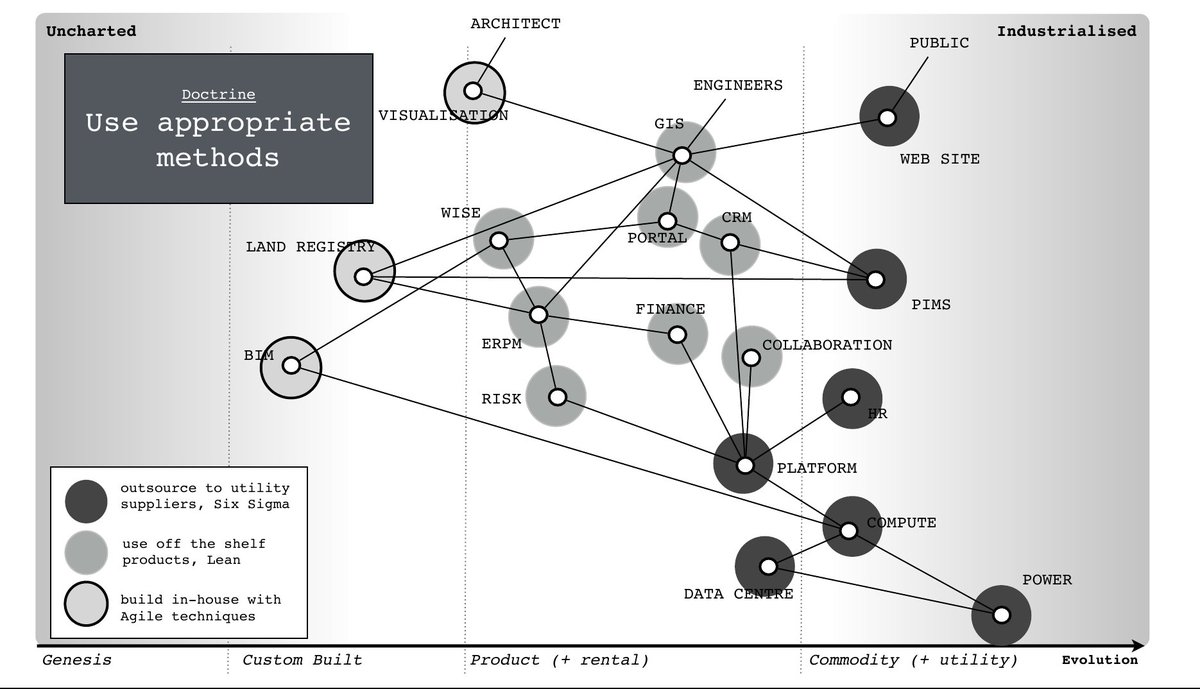
X : Many things?
Me : Yes. Here's a handy table of universally useful patterns. Do all of these and you'll have more agility as an organisation.
X : That means Agile?
Me : You may well be using XP in some places and SCRUM etc.
Me : Yes. Here's a handy table of universally useful patterns. Do all of these and you'll have more agility as an organisation.
X : That means Agile?
Me : You may well be using XP in some places and SCRUM etc.
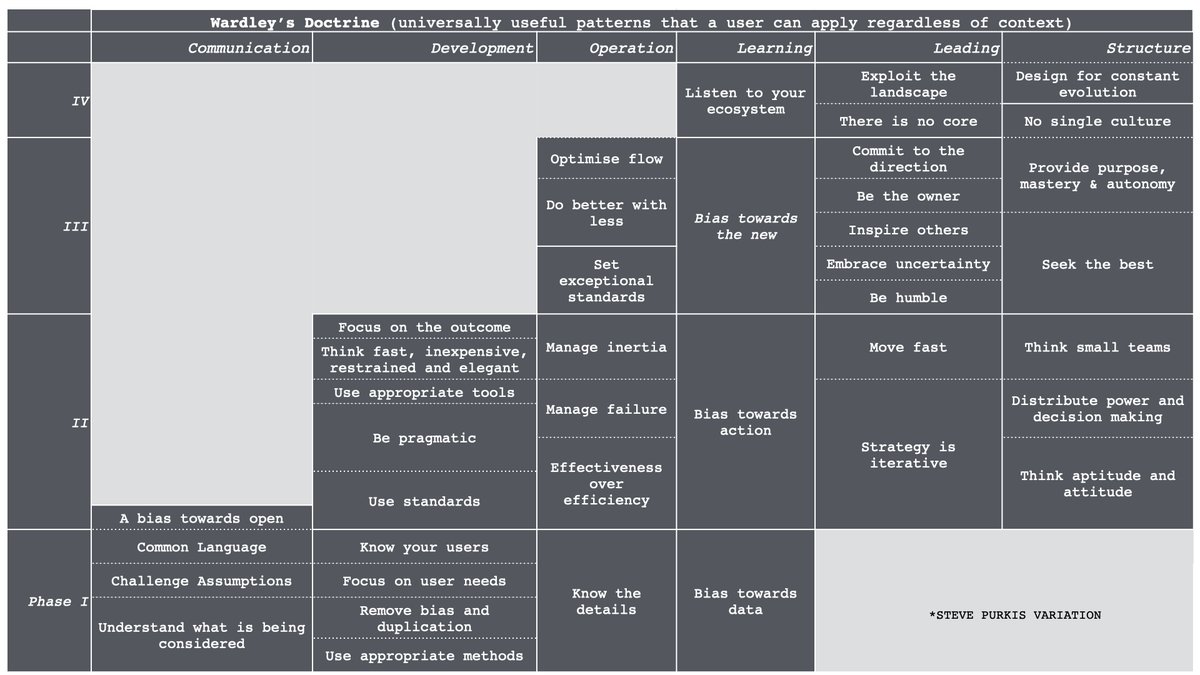
X : Surely it's simpler to just use Agile everywhere?
Me : That won't bring you agility, it'll bring you frustration, inefficiency and a mess.
Me : That won't bring you agility, it'll bring you frustration, inefficiency and a mess.
X : I heard about this project ...
Me : Look, I can take SCRUM and keep on adding artifacts until it resembles 6-sigma and call it "Agile" whilst using it to minimise deviation on industrialised things. It'll fare badly against lightweight XP for genesis of the novel and new ...
Me : Look, I can take SCRUM and keep on adding artifacts until it resembles 6-sigma and call it "Agile" whilst using it to minimise deviation on industrialised things. It'll fare badly against lightweight XP for genesis of the novel and new ...
... all of these methods have evolved to "their" context (an instance of some thing), the commonly repeated mistake is trying to make the magic one size fits all. 
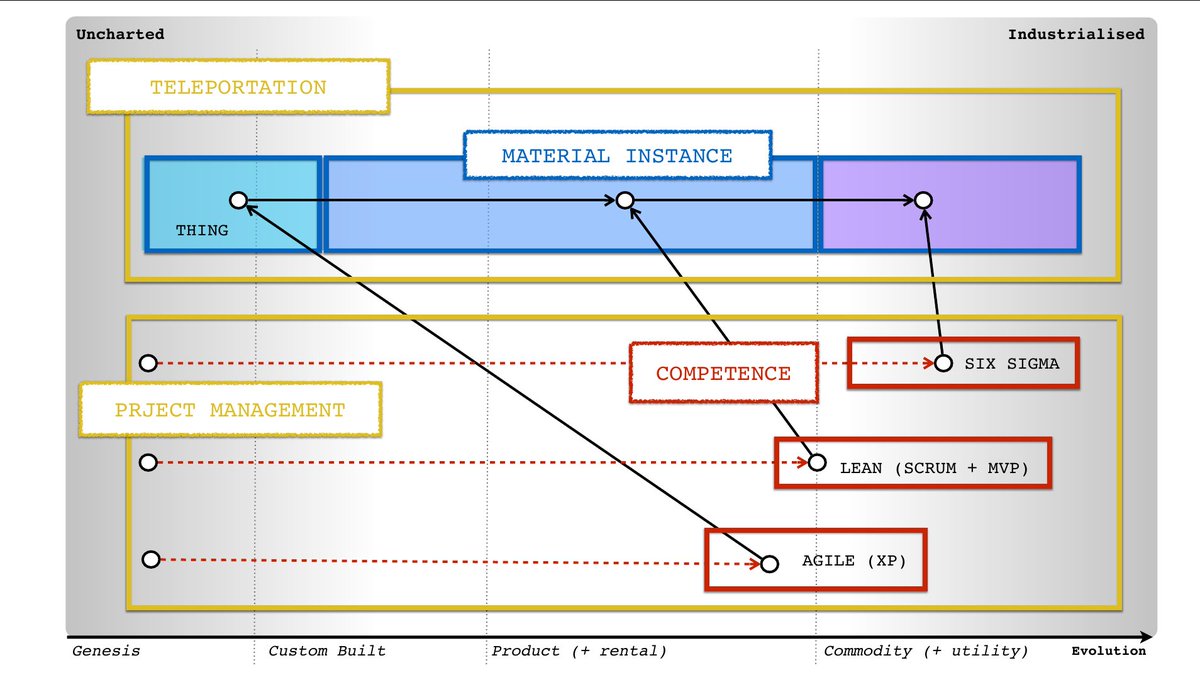
X : Teleportation?
Me : The genesis of teleportation will be very diferent from teleportation as a utility service.
X : But if you use the right bits of our agile process then it works everywhere.
Me : If YOU use the RIGHT process ... I thought agile was people over process?
Me : The genesis of teleportation will be very diferent from teleportation as a utility service.
X : But if you use the right bits of our agile process then it works everywhere.
Me : If YOU use the RIGHT process ... I thought agile was people over process?
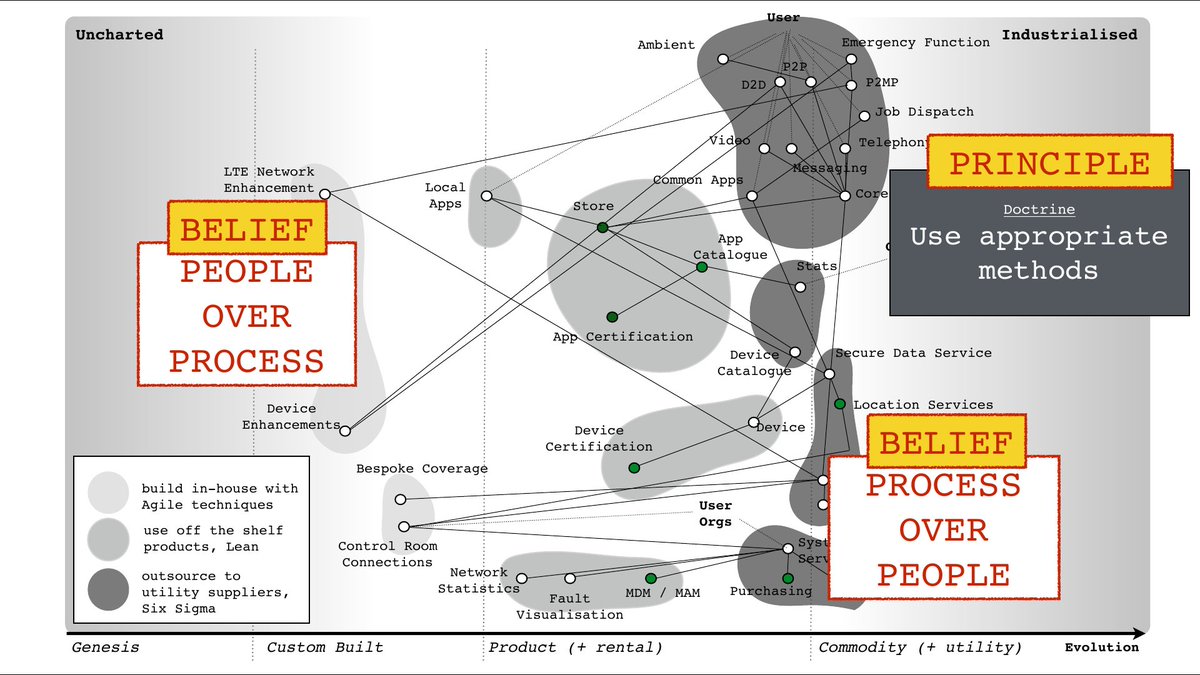
X : Why do people seek a one size fits all?
Me : Ashby's law of requisite variety.
X : Explain?
Me : Roughly speaking, the controlling element of a system needs as much complexity as the input and outputs of what is being controlled.
X : Eh?
Me : Ashby's law of requisite variety.
X : Explain?
Me : Roughly speaking, the controlling element of a system needs as much complexity as the input and outputs of what is being controlled.
X : Eh?
Me : Two solutions, Either you make sure your management has the cognitive capbility to manage a complex and complicated environment or you pretend what is being managed is simple.
X : You're going to say we "pretend"
Me : KPIs, 2x2 ... it's all pretenses of simplicity.
X : You're going to say we "pretend"
Me : KPIs, 2x2 ... it's all pretenses of simplicity.
X : Is that effective?
Me : To pretend? Depends. If everyone else does then yes because no-one gains an advantage. It's ok to be useless as long as everyone else is. It's fine to ignore all the heuristics spelt out in the doctrine table as long as all your competitors do.
Me : To pretend? Depends. If everyone else does then yes because no-one gains an advantage. It's ok to be useless as long as everyone else is. It's fine to ignore all the heuristics spelt out in the doctrine table as long as all your competitors do.
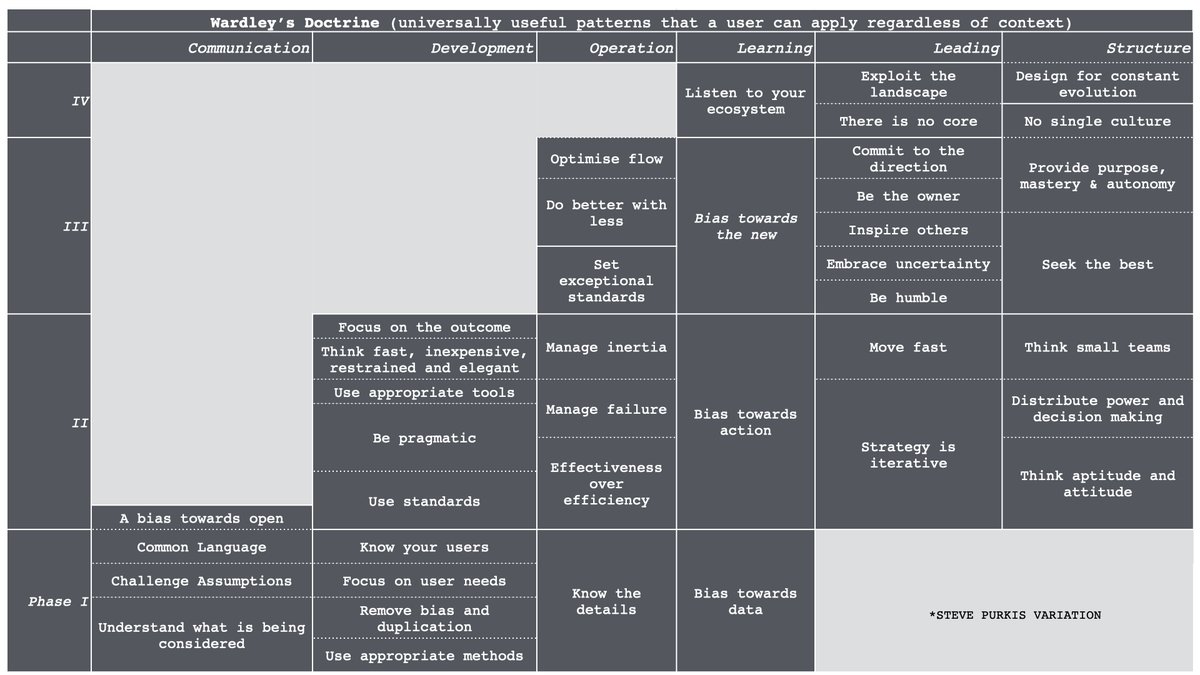
X : We're starting to work on identifying user needs.
Me : Oh dear, slippery slope. You might start becoming more competent and then your competitors will have to react as well (if not already).
Me : Oh dear, slippery slope. You might start becoming more competent and then your competitors will have to react as well (if not already).
Me : Have you heard six sigma vs agile arguments?
X : Yes
Me : Have you realised these are all beliefs, these are all cults?
X : Agile and Six Sigma as cults?
Me : Yes. And Lean. They all wish you to suspend thought and apply their blessed method, with priests and symbols etc.
X : Yes
Me : Have you realised these are all beliefs, these are all cults?
X : Agile and Six Sigma as cults?
Me : Yes. And Lean. They all wish you to suspend thought and apply their blessed method, with priests and symbols etc.
X : Isn't Wardley Mapping a cult then?
Me : Yes. It's a belief in looking at your environment and applying thought i.e. applying appropriate methods. That heuristic also applies to mapping itself. So it's a cult which also believes it is wrong and better models will appear.
Me : Yes. It's a belief in looking at your environment and applying thought i.e. applying appropriate methods. That heuristic also applies to mapping itself. So it's a cult which also believes it is wrong and better models will appear.
X : It is wrong?
Me : The maps are imperfect (by nature) and wrong (being models). Hence the patterns are wrong, the doctrine is wrong ... the only thing that matters is whether they are useful. A better model will come along. That's a key driving belief of mapping. It's wrong.
Me : The maps are imperfect (by nature) and wrong (being models). Hence the patterns are wrong, the doctrine is wrong ... the only thing that matters is whether they are useful. A better model will come along. That's a key driving belief of mapping. It's wrong.
... but that acceptance of being wrong allows challenge and that applies not only to maps but mapping itself. Understand the landscape and apply thought whether a large engineering system, a nation state or a map of mapping. 
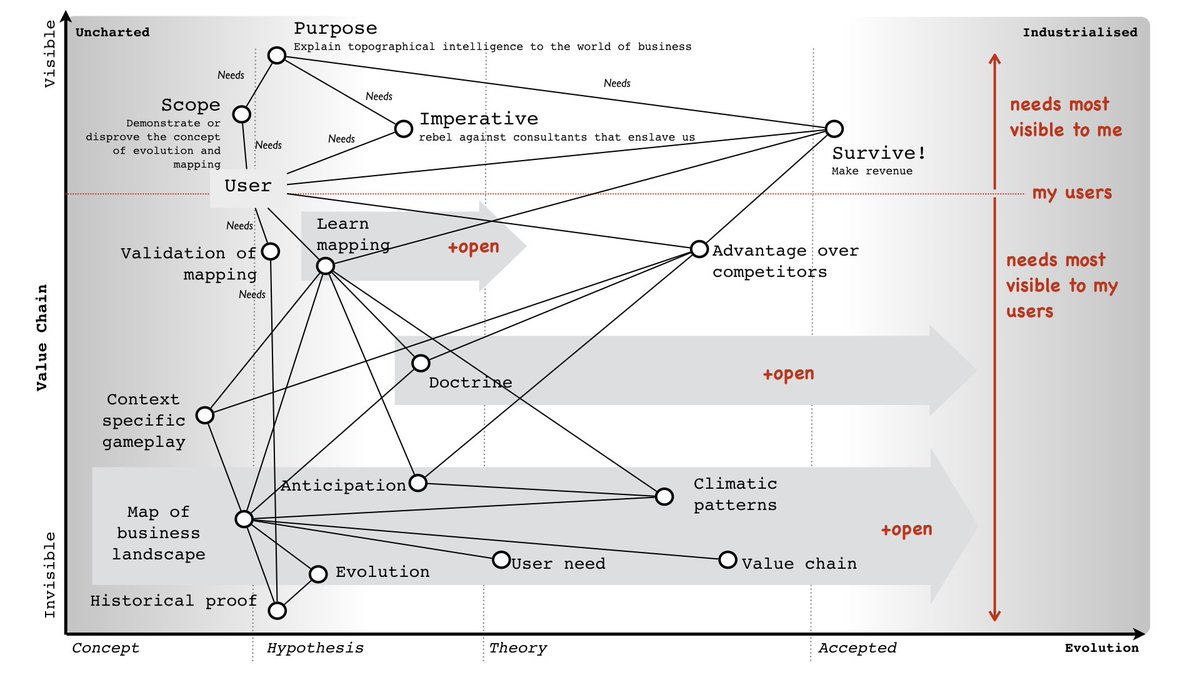
X : Useful?
Me : Yes. That is everwhere in mapping. Look at the doctrine. A list of universally "useful" patterns not universally "right" patterns. There is no "right" in mapping, there are just things that have been found "useful".
If you want "dogma" then join another cult.
Me : Yes. That is everwhere in mapping. Look at the doctrine. A list of universally "useful" patterns not universally "right" patterns. There is no "right" in mapping, there are just things that have been found "useful".
If you want "dogma" then join another cult.
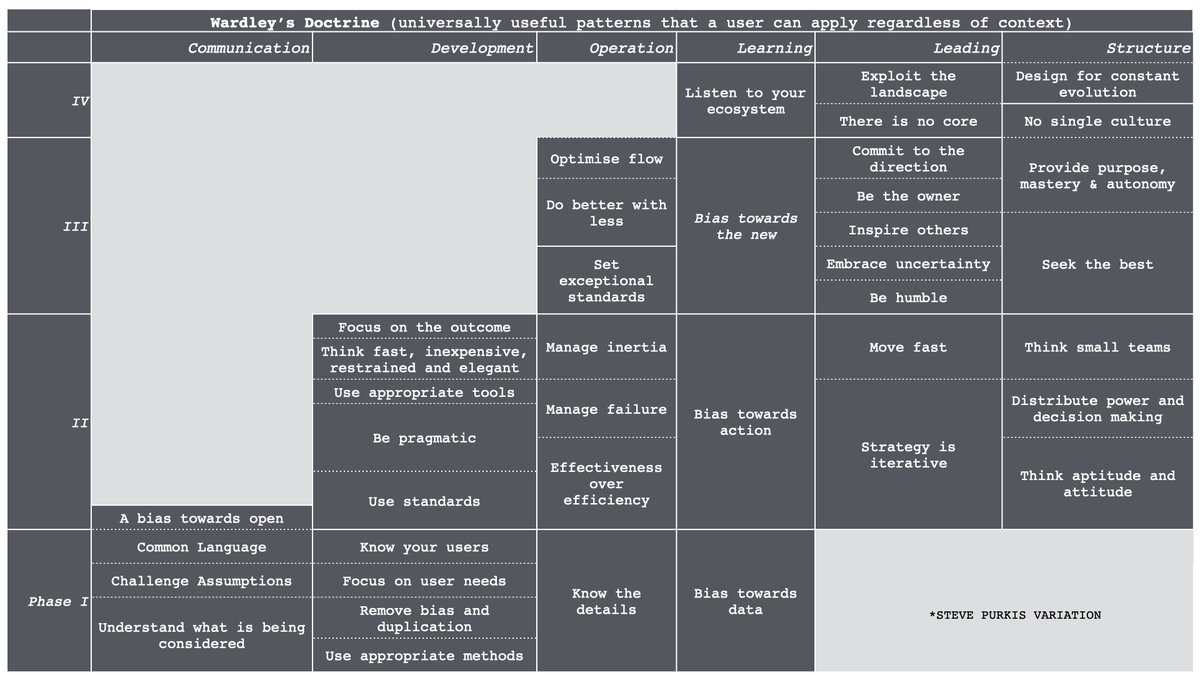
X : You have dogma,
Me : ?
X : You have certainty that you are wrong and something more useful will appear.
Me : Fair enough. We are the cult of not believing in ourselves, of looking at the landscape, applying thought and learning through discovering more useful models.
Me : ?
X : You have certainty that you are wrong and something more useful will appear.
Me : Fair enough. We are the cult of not believing in ourselves, of looking at the landscape, applying thought and learning through discovering more useful models.
X : That's great but I need something simple that I can apply to my organisation. This is too complex.
Me : Ah, did I tell you about Ashby's .... oh, I'll keep it simple ... go find a 2x2, I'm sure someone will sell you one.
X : Will it work?
Me : Depends upon your competitors.
Me : Ah, did I tell you about Ashby's .... oh, I'll keep it simple ... go find a 2x2, I'm sure someone will sell you one.
X : Will it work?
Me : Depends upon your competitors.
X : You're not a fan of agile?
Me : I love agile, especially XP. I think @KentBeck work was outstanding.
X : But ...
Me : I also love Six Sigma. It's a fantastic method. Ditto Lean. They are all great, they just have contexts where they are useful and others where they're not.
Me : I love agile, especially XP. I think @KentBeck work was outstanding.
X : But ...
Me : I also love Six Sigma. It's a fantastic method. Ditto Lean. They are all great, they just have contexts where they are useful and others where they're not.
X : Explain.
Me : Caveated by it's a map and therefore wrong, a useful model (aka the best model I have so far) is ...
Me : Caveated by it's a map and therefore wrong, a useful model (aka the best model I have so far) is ...
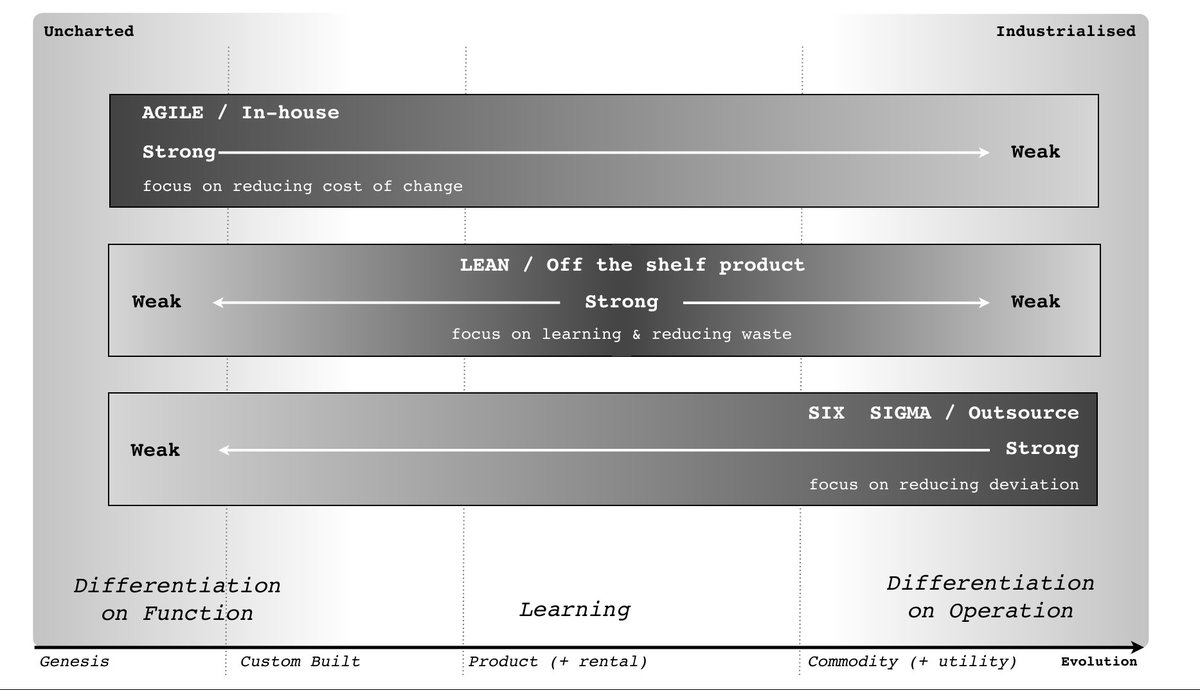
X : I think you're wrong.
Me : I know I'm wrong. This is just the best model I have for now.
X : You're still wrong.
Me : This is a circular argument. I agree I'm wrong, now ... show me a better model (aka more useful) than the one I have.
Me : I know I'm wrong. This is just the best model I have for now.
X : You're still wrong.
Me : This is a circular argument. I agree I'm wrong, now ... show me a better model (aka more useful) than the one I have.
X : You're still wrong.
Me : It is wrong. It is simply the best model I have.
X : Lean works everywhere.
Me : Maximising for deviation (i.e. discovery), learning about something and minimising for deviation (i.e. industrialisation) are not the same, nor should be the methods.
Me : It is wrong. It is simply the best model I have.
X : Lean works everywhere.
Me : Maximising for deviation (i.e. discovery), learning about something and minimising for deviation (i.e. industrialisation) are not the same, nor should be the methods.
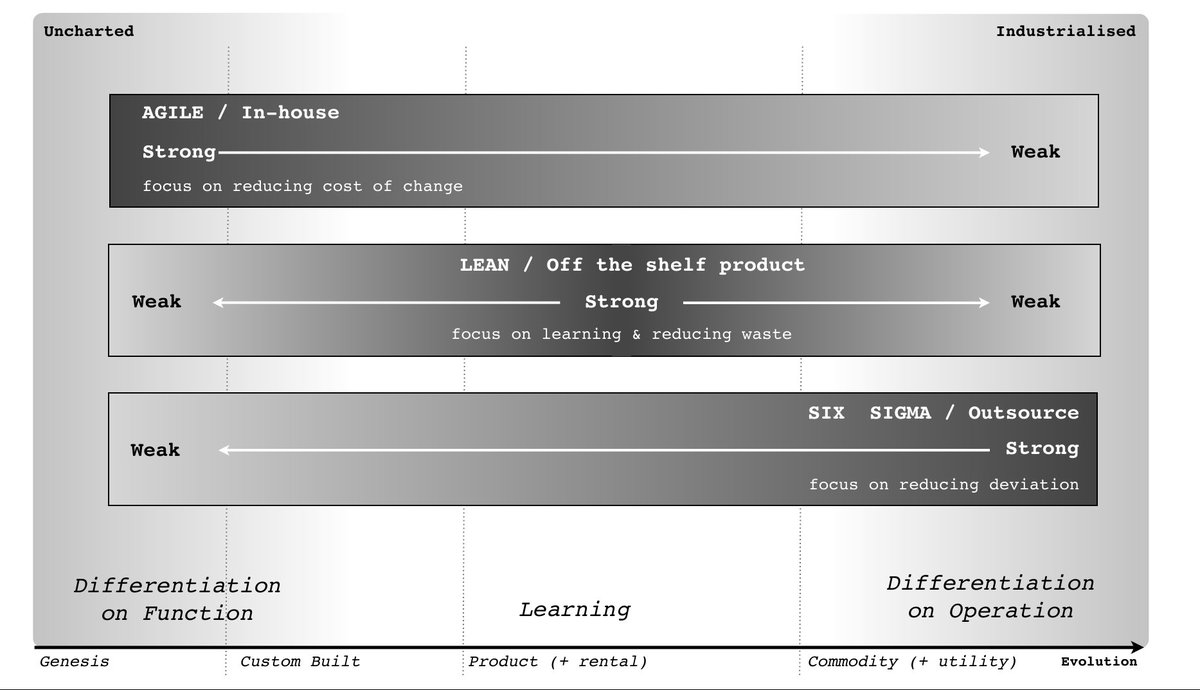
... there are universally useful principles (i.e. patterns that apply across any context) such as "focus on user needs". You can take any of the doctrine and use with any of the methods (XP, Lean, Six Sigma) but it doesn't make the method universal. The method has context. 
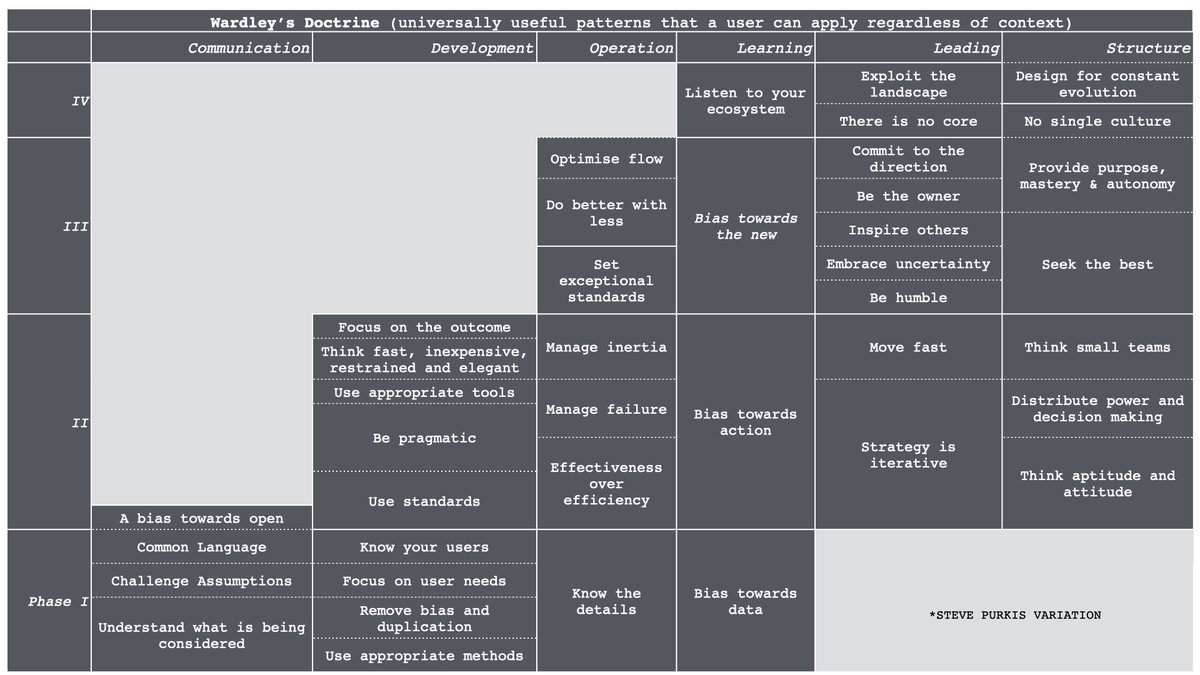
If I had found a universal method then it would be in my doctrine table. Rather than "Use appropriate methods", it would say "Use XYZ".
I have found no such method. Instead I have found religions, beliefs in a true faith and 15 years of being shouted at for not agreeing.
I have found no such method. Instead I have found religions, beliefs in a true faith and 15 years of being shouted at for not agreeing.
I do not care for your priesthoods, your true faiths, your beliefs in the rightness of your method. As far as I am concerned, everyone who tells me that their method (agile, lean or six sigma) is "right" and "works everywhere" is a charlatan or a management consultant.
X : What about believers?
Me : I've never met an actual practitioner, an engineer on the coal-face who doesn't have doubts over a method or examples where it didn't work. I've only ever met coaches, certification providers and management consultants that profess its rightness.
Me : I've never met an actual practitioner, an engineer on the coal-face who doesn't have doubts over a method or examples where it didn't work. I've only ever met coaches, certification providers and management consultants that profess its rightness.
X : What do you think they should do differently?
Me : Start with the assumption that the method is wrong and try to determine in what contexts the method is more useful than other wrong methods. Find the constraints, the boundaries to its usefulness.
Me : Start with the assumption that the method is wrong and try to determine in what contexts the method is more useful than other wrong methods. Find the constraints, the boundaries to its usefulness.
X : Is that what people do?
Me : No. They start with the assumption that the method is right and then look to add additional bits so that their method is now universal and works everywhere. See SAFe.
Me : No. They start with the assumption that the method is right and then look to add additional bits so that their method is now universal and works everywhere. See SAFe.
X : The doctrine feels too vague to be useful. How does one decide what methods are appropriate?
Me : Via the application of thought,. Ditto all the principles. "Focus on user needs" means you have to think about the users ...
Me : Via the application of thought,. Ditto all the principles. "Focus on user needs" means you have to think about the users ...
The principles aren't a checklist of answers designed to replace thought. They are simply a guide which requires thought as you apply them to your context.
It is amazing to sit down with a company, go through the doctrine table and hear people go "we hadn't thought of that" ...
It is amazing to sit down with a company, go through the doctrine table and hear people go "we hadn't thought of that" ...
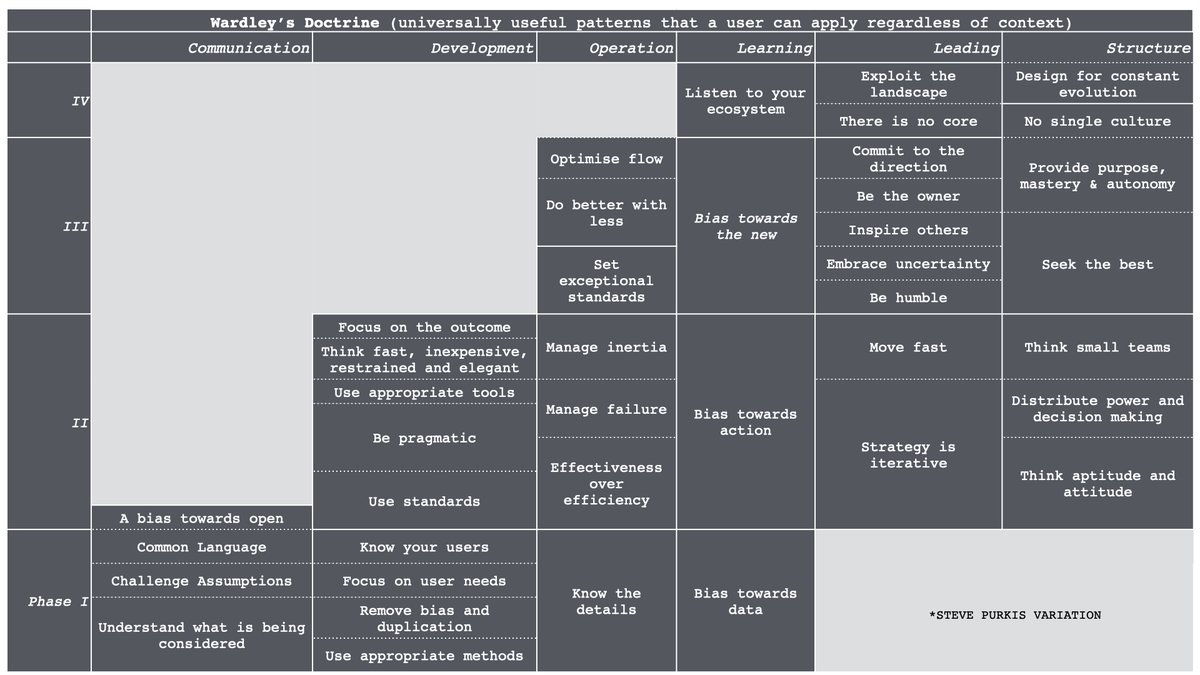
... I kid you not but in 2009, I would sit down with companies and say "Do you focus on the user needs" and execs would go "Gosh, that's an interesting idea. We don't do that. Maybe we should do something" etc etc etc.,
• • •
Missing some Tweet in this thread? You can try to
force a refresh







